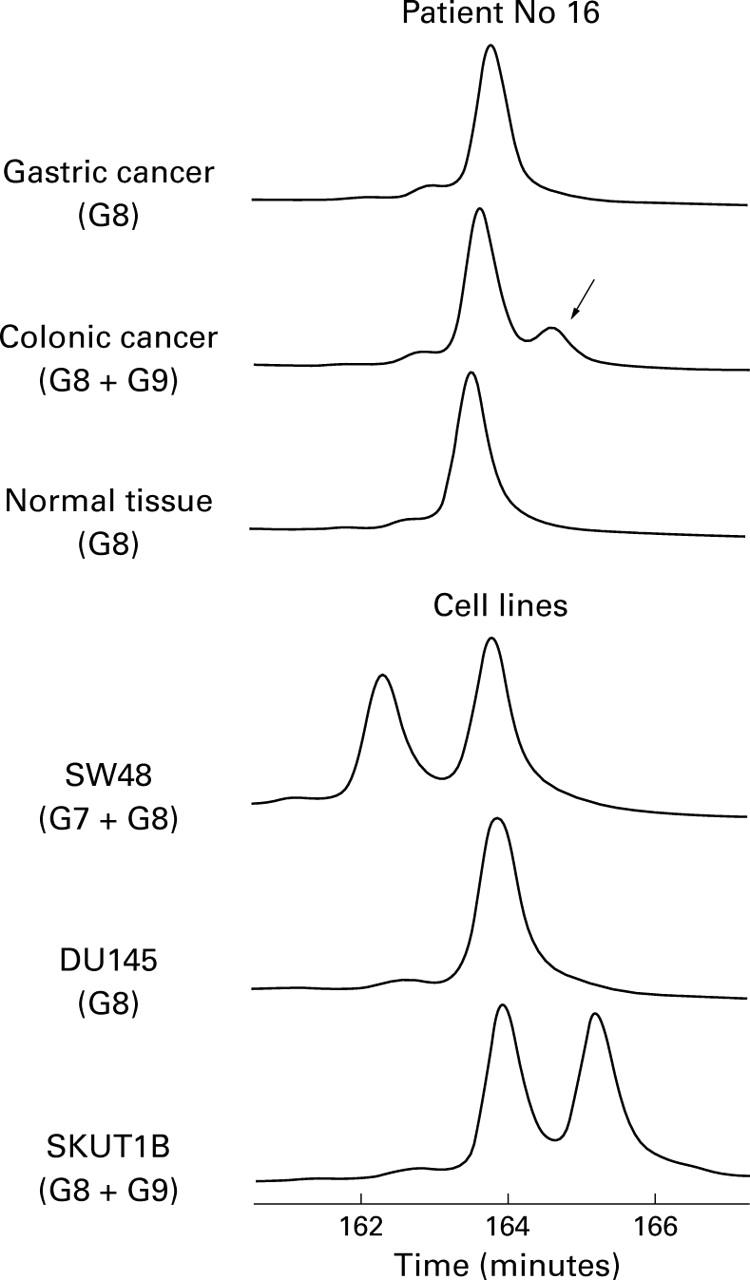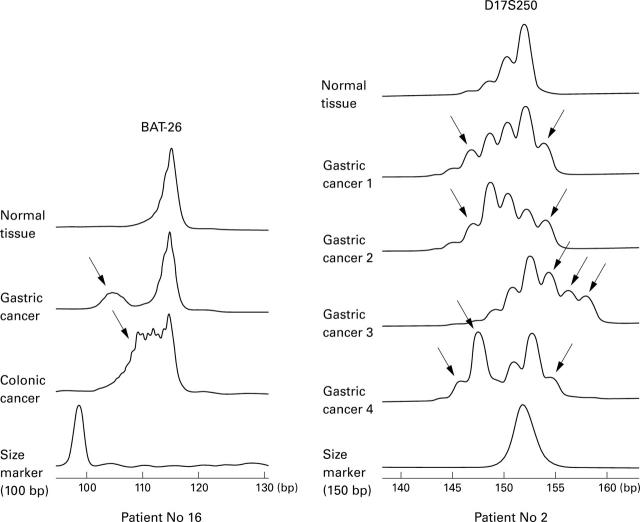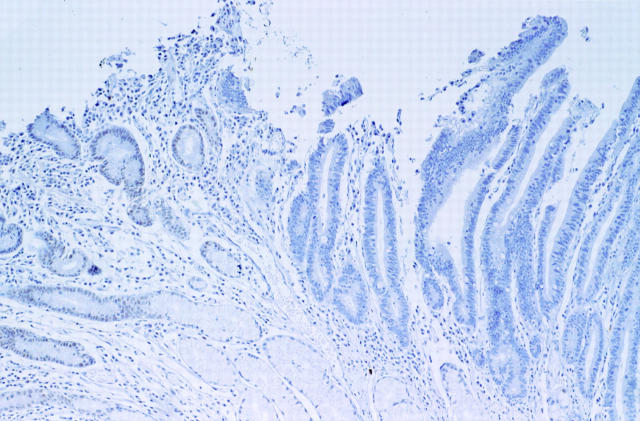Abstract
BACKGROUND—Little is known about the genetic alterations in multiple primary cancers of the gastrointestinal tract. Microsatellite instability (MSI) is frequently observed in hereditary non-polyposis colorectal cancer (HNPCC), and multiple primary cancers is a feature of this syndrome. AIMS—To identify MSI incidence, target gene mutation, and mismatch repair (MMR) protein status in patients with multiple primary cancers of the gastrointestinal tract. SUBJECTS—Fifty seven cancers from 22 Japanese patients with multiple primary cancers of the stomach, duodenum, colon, and rectum. METHODS—MSI was examined at 5-7 microsatellite loci. Mutation analysis for TGFβRII, IGFIIR, and BAX was performed in cancers with MSI. MMR protein status was examined by immunohistochemical analysis using a monoclonal antibody against hMSH2 and hMLH1. RESULTS—MSI was observed in 16 of 22 patients (73%) and in 29 of 57 lesions (51%). High frequency MSI (MSI-H) was found often in patients with multiple cancers in the same organ (p=0.042), especially in multiple gastric cancer patients (p=0.038). In contrast, patients with multiple cancers in different organs had a tendency to show low frequency MSI (MSI-L) or microsatellite stable (MSS) phenotype. Both target gene mutation and decreased expression of MMR protein were found only in seven lesions of three patients with MSI at more than four microsatellite loci. CONCLUSIONS—These results suggest that genetic instability may play an important role in the development of multiple gastrointestinal cancers but there may be different genetic alterations between multiple gastrointestinal cancers of the same and different organs. Keywords: microsatellite instability; multiple primary cancer; hereditary non-polyposis colorectal cancer
Full Text
The Full Text of this article is available as a PDF (189.4 KB).
Figure 1 .
Typical results of microsatellite instability (MSI). MSI is seen as extra peaks in tumours (arrows) compared with normal tissues. In patient No 16, both gastric and colonic cancers showed MSI of BAT-26 (left). In patient No 2, all four gastric cancers showed MSI of D17S250 (right).
Figure 2 .

Typical results of target gene mutations. SW48 and SKUT1B are known to have mutated IGFIIR (G7+G8 and G8+G9, respectively). DU145 have wild type (G8). In patient No 16, colonic cancer showed mutated IGFIIR (G8+G9, arrow).
Figure 3 .
Immunostaining for hMSH2 in gastric cancer from patient No 16. Normal gastric epithelium (left) and infiltrating inflammatory cells were stained, but in cancer tissue (right) hMSH2 protein expression was very weak.
Selected References
These references are in PubMed. This may not be the complete list of references from this article.
- Aaltonen L. A., Peltomäki P., Mecklin J. P., Järvinen H., Jass J. R., Green J. S., Lynch H. T., Watson P., Tallqvist G., Juhola M. Replication errors in benign and malignant tumors from hereditary nonpolyposis colorectal cancer patients. Cancer Res. 1994 Apr 1;54(7):1645–1648. [PubMed] [Google Scholar]
- Boland C. R., Thibodeau S. N., Hamilton S. R., Sidransky D., Eshleman J. R., Burt R. W., Meltzer S. J., Rodriguez-Bigas M. A., Fodde R., Ranzani G. N. A National Cancer Institute Workshop on Microsatellite Instability for cancer detection and familial predisposition: development of international criteria for the determination of microsatellite instability in colorectal cancer. Cancer Res. 1998 Nov 15;58(22):5248–5257. [PubMed] [Google Scholar]
- Brown S. R., Finan P. J., Hall N. R., Bishop D. T. Incidence of DNA replication errors in patients with multiple primary cancers. Dis Colon Rectum. 1998 Jun;41(6):765–769. doi: 10.1007/BF02236266. [DOI] [PubMed] [Google Scholar]
- Chong J. M., Fukayama M., Hayashi Y., Takizawa T., Koike M., Konishi M., Kikuchi-Yanoshita R., Miyaki M. Microsatellite instability in the progression of gastric carcinoma. Cancer Res. 1994 Sep 1;54(17):4595–4597. [PubMed] [Google Scholar]
- Dietmaier W., Wallinger S., Bocker T., Kullmann F., Fishel R., Rüschoff J. Diagnostic microsatellite instability: definition and correlation with mismatch repair protein expression. Cancer Res. 1997 Nov 1;57(21):4749–4756. [PubMed] [Google Scholar]
- Dietmaier W., Wallinger S., Bocker T., Kullmann F., Fishel R., Rüschoff J. Diagnostic microsatellite instability: definition and correlation with mismatch repair protein expression. Cancer Res. 1997 Nov 1;57(21):4749–4756. [PubMed] [Google Scholar]
- Goelz S. E., Hamilton S. R., Vogelstein B. Purification of DNA from formaldehyde fixed and paraffin embedded human tissue. Biochem Biophys Res Commun. 1985 Jul 16;130(1):118–126. doi: 10.1016/0006-291x(85)90390-0. [DOI] [PubMed] [Google Scholar]
- Hoang J. M., Cottu P. H., Thuille B., Salmon R. J., Thomas G., Hamelin R. BAT-26, an indicator of the replication error phenotype in colorectal cancers and cell lines. Cancer Res. 1997 Jan 15;57(2):300–303. [PubMed] [Google Scholar]
- Horii A., Han H. J., Shimada M., Yanagisawa A., Kato Y., Ohta H., Yasui W., Tahara E., Nakamura Y. Frequent replication errors at microsatellite loci in tumors of patients with multiple primary cancers. Cancer Res. 1994 Jul 1;54(13):3373–3375. [PubMed] [Google Scholar]
- Liu B., Parsons R., Papadopoulos N., Nicolaides N. C., Lynch H. T., Watson P., Jass J. R., Dunlop M., Wyllie A., Peltomäki P. Analysis of mismatch repair genes in hereditary non-polyposis colorectal cancer patients. Nat Med. 1996 Feb;2(2):169–174. doi: 10.1038/nm0296-169. [DOI] [PubMed] [Google Scholar]
- Markowitz S., Wang J., Myeroff L., Parsons R., Sun L., Lutterbaugh J., Fan R. S., Zborowska E., Kinzler K. W., Vogelstein B. Inactivation of the type II TGF-beta receptor in colon cancer cells with microsatellite instability. Science. 1995 Jun 2;268(5215):1336–1338. doi: 10.1126/science.7761852. [DOI] [PubMed] [Google Scholar]
- Mutter G. L., Boynton K. A. PCR bias in amplification of androgen receptor alleles, a trinucleotide repeat marker used in clonality studies. Nucleic Acids Res. 1995 Apr 25;23(8):1411–1418. doi: 10.1093/nar/23.8.1411. [DOI] [PMC free article] [PubMed] [Google Scholar]
- Rampino N., Yamamoto H., Ionov Y., Li Y., Sawai H., Reed J. C., Perucho M. Somatic frameshift mutations in the BAX gene in colon cancers of the microsatellite mutator phenotype. Science. 1997 Feb 14;275(5302):967–969. doi: 10.1126/science.275.5302.967. [DOI] [PubMed] [Google Scholar]
- Sengupta S. B., Yiu C. Y., Boulos P. B., De Silva M., Sams V. R., Delhanty J. D. Genetic instability in patients with metachronous colorectal cancers. Br J Surg. 1997 Jul;84(7):996–1000. doi: 10.1002/bjs.1800840725. [DOI] [PubMed] [Google Scholar]
- Souza R. F., Appel R., Yin J., Wang S., Smolinski K. N., Abraham J. M., Zou T. T., Shi Y. Q., Lei J., Cottrell J. Microsatellite instability in the insulin-like growth factor II receptor gene in gastrointestinal tumours. Nat Genet. 1996 Nov;14(3):255–257. doi: 10.1038/ng1196-255. [DOI] [PubMed] [Google Scholar]
- Strickler J. G., Zheng J., Shu Q., Burgart L. J., Alberts S. R., Shibata D. p53 mutations and microsatellite instability in sporadic gastric cancer: when guardians fail. Cancer Res. 1994 Sep 1;54(17):4750–4755. [PubMed] [Google Scholar]
- Tomoda H., Taketomi A., Baba H., Kohnoe S., Seo Y., Saito T. Multiple primary colorectal and gastric carcinoma in Japan. Oncol Rep. 1998 Jan-Feb;5(1):147–149. [PubMed] [Google Scholar]
- Vasen H. F., Mecklin J. P., Khan P. M., Lynch H. T. The International Collaborative Group on Hereditary Non-Polyposis Colorectal Cancer (ICG-HNPCC). Dis Colon Rectum. 1991 May;34(5):424–425. doi: 10.1007/BF02053699. [DOI] [PubMed] [Google Scholar]




